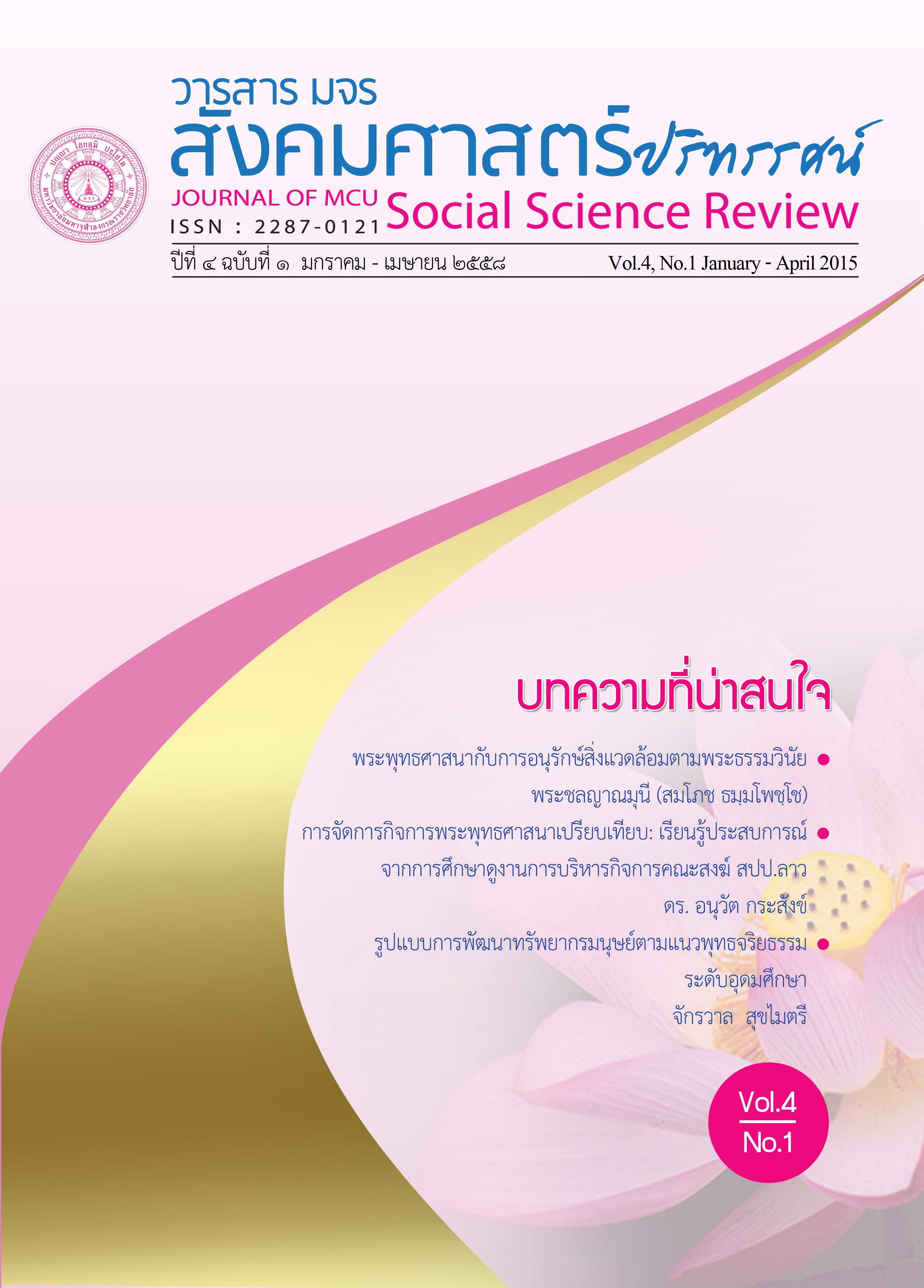กลยุทธ์การพัฒนาสมรรถนะบุคคลตามหลักพุทธธรรมของสถาบันพัฒนา ฝีมือแรงงานภาคใต้ตอนบน
คำสำคัญ:
กลยุทธ์การพัฒนา, สถาบันพัฒนาฝีมือแรงงานบทคัดย่อ
การวิจัยครั้งนี้ มีวัตถุประสงค์เพื่อ ๑) ศึกษาการบูรณาการแนวคิด ทฤษฎีการพัฒนา สมรรถนะบุคลากรกับหลักพุทธธรรม ๒) ศึกษาสภาพปัญหาและสภาพทั่วไปของการพัฒนา สมรรถนะบุคลากรของสถาบันพัฒนาฝีมือแรงงานภาคใต้ตอนบนและ ๓) นําเสนอกลยุทธ์การพัฒนา สมรรถนะบุคลากรตามหลักพุทธธรรมของสถาบันพัฒนาฝีมือแรงงานภาคใต้ตอนบน ระเบียบวิธีวิจัยที่ใช้ คือ การวิจัยแบบเชิงคุณภาพ (Qualitative Research) เก็บข้อมูล ๒ ขั้นตอน คือการสัมภาษณ์เชิงลึก (Structured In-depth-Interview) และการสนทนากลุ่มเฉพาะ (Focus Group Discussion) การสัมภาษณ์เชิงลึก มีผู้ให้ข้อมูลสําคัญ (Key Informants) แบ่งเป็น ๕ กลุ่ม เลือกแบบเจาะจง (Purposefully Selected) ได้แก่ ผู้อํานวยการ/หัวหน้า/เจ้าหน้าที่/ ลูกจ้างประจําที่อยู่ในสถาบันพัฒนาฝีมือแรงงานภาคใต้ตอนบน และพระสงฆ์ระดับผู้ปกครองสงฆ์ใน เขตภาคใต้ตอนบน จํานวน ๒๘ รูป/คน เครื่องมือในการเก็บข้อมูลได้แก่ แบบสัมภาษณ์ เชิงลึกที่มี โครงสร้าง (Structured In-depth-Interview) เก็บข้อมูลด้วยการสัมภาษณ์เชิงลึกตัวต่อตัว (Face to-Face In-depth-Interview) วิเคราะห์ข้อมูลด้วยการพรรณนาความ (Descriptive Interpretation) สําหรับการสนทนากลุ่มเฉพาะ มีผู้ร่วมสนทนากลุ่มเฉพาะ จํานวน ๑๕ รูป/คน เลือกแบบเจาะจง เก็บข้อมูลด้วยการสนทนากลุ่ม วิเคราะห์ข้อมูลด้วยการพรรณนาความ
ผลการวิจัยพบว่า ๑) การบูรณาการแนวคิด ทฤษฎีการพัฒนาสมรรถนะบุคลากรกับหลักพุทธธรรมของ สถาบันพัฒนาฝีมือแรงงานภาคใต้ตอนบน พบว่า การบูรณาการเพื่อการพัฒนาสมรรถนะบุคลากร ประกอบด้วย ๓ ขั้นตอน ได้แก่ ๑. ขั้นการปรับเปลี่ยนพฤติกรรมทางกายและทางวาจาให้มีความ เป็นปกติ มีความเหมาะสม และมีความงดงาม ที่ช่วยในการเสริมสร้างพฤติกรรมของบุคลากรให้มี ความน่าเชื่อถือในสังคมมากยิ่งขึ้น ๒. ขั้นการปรับเปลี่ยนเป้าหมายทางด้านจิตใจให้มีความตั้งมั่น มั่ง คง และจริงจังในการปฏิบัติหน้าที่ของตนเอง ที่ช่วยในการเสริมสร้างพื้นฐานให้เกิดคุณธรรมและ จริยธรรมของบุคลากรและ ๓. ขั้นการปรับเปลี่ยนวิธีการเรียนรู้ในการปฏิบัติงานอย่างสม่ําเสมอให้ เกิดเป็นประสบการณ์ที่จะนํามาปรับปรุงแก้ไข เพื่อเสริมสร้างและป้องกันความผิดพลาดที่จะเกิดขึ้น ในอนาคต
๒) สภาพปัญหาและสภาพทั่วไปของการพัฒนาสมรรถนะบุคลากรของสถาบันพัฒนา ฝีมือแรงงานภาคใต้ตอนบน พบว่า สภาพปัญหาใหญ่ ๆ มีทั้งสิ้น ๕ ประการ ได้แก่ ๑. สภาพปัญหา ด้านการมุ่งผลสัมฤทธิ์ ๒. สภาพปัญหาด้านการบริการที่ดี ต. สภาพปัญหาด้านการสั่งสมความ เชี่ยวชาญในงานอาชีพ ๔. สภาพปัญหาด้านการยึดมั่นในความถูกต้อง ชอบธรรม และจริยธรรม ๕. สภาพปัญหาด้านการทํางานเป็นทีม จึงทําให้การพัฒนาไม่ตรงกับสมรรถนะของบุคลากรแต่ละคน เช่น ทํางานไม่ตรงกับสายงาน การถูกย้ายไปทํางานด้านอื่น ข้อคุณธรรม จริยธรรม วินัย ยังมีน้อย เพราะเน้นแต่ทักษะ ฝีมือและความชํานาญวิชาการ ไม่ได้เน้นคุณธรรม การเอาใจใส่หรือให้ ความสําคัญกับการพัฒนาสมรรถนะของบุคลากรมีน้อย ขาดการร่วมมือและบูรณาการกับ หน่วยงานภายในและภายนอก หลักสูตรไม่ตรงกับความต้องการ ประเด็นเหล่านี้เป็นทั้งปัญหาและ เป็นอุปสรรคที่ขวางกั้นที่จะทําให้ไม่ก่อให้เกิดการพัฒนาสมรรถนะบุคลากรของสถาบันพัฒนาฝีมือ พัฒนาแรงงานภาคใต้ตอนบน
๓) กลยุทธ์การพัฒนาสมรรถนะบุคลากรตามหลักพุทธธรรมของสถาบันพัฒนาฝีมือ แรงงานภาคใต้ตอนบน พบว่า กลยุทธ์การพัฒนาสมรรถนะของบุคลากร ประกอบไปด้วย ๑. กล ยุทธ์การพัฒนาสมรรถนะตามหลักพุทธธรรมด้านการมุ่งผลสัมฤทธิ์ ๒. กลยุทธ์การพัฒนาสมรรถนะ ตามหลักพุทธธรรมด้านการบริการที่ดี ต. กลยุทธ์การพัฒนาสมรรถนะตามหลักพุทธธรรมด้านการ สั่งสมความเชี่ยวชาญในงานอาชีพ ๔. กลยุทธ์การพัฒนาสมรรถนะตามหลักพุทธธรรมด้านการยึด มั่นในความถูกต้องชอบธรรม และจริยธรรม ๕. กลยุทธ์การพัฒนาสมรรถนะตามหลักพุทธธรรมด้าน การทํางานเป็นทีม เพื่อการพัฒนาบุคลากรให้เกิดพฤติกรรมที่ดี สามารปฏิบัติอยู่ในกรอบ กติกา กฎเกณฑ์ ระเบียบวินัยซึ่งส่งผลต่อการปฏิบัติงาน (อธิสีลสิกขา) จนสามารถเกิดเป็นความมั่นคงตาม มาตรฐานทางจรรยาบรรณที่จะปฏิบัติหน้าที่ด้วยความรู้ความสามารถ (อธิจิตตสิกขา) ของเจ้าหน้าที่ หรือพนักงานในสถาบันพัฒนาฝีมือแรงงานภาคใต้ตอนบน (สพภ. ๑๑) ให้มีคุณสมบัติตามที่องค์กร ต้องการ และเพื่อการแก้ไขปัญหาการพัฒนาสมรรถนะบุคลากรของสถาบันพัฒนาฝีมือแรงงาน นอกจากนี้ การฝึกปฏิบัติ ๒ ประการดังกล่าว เป็นรากฐานที่มีส่วนช่วยเสริมให้บุคลากรเกิดทักษะ ความฉลาด ความชํานาญ ประสบการณ์ กระบวนการเรียนรู้ สามารถแก้ไขปัญหาที่เกิดขึ้นได้ทันถ่วง ที่ (อธิปัญญาสิกขา)
เอกสารอ้างอิง
(๑) หนังสือ
จุมพล พูลภัทรชีวิน และคณะ. การวิจัยและพัฒนากระบวนการสร้างความดีมีคุณธรรม, ศูนย์ส่งเสริมและพัฒนาพลังแผ่นดินเชิงคุณธรรมสํานักงานบริหารและพัฒนาองค์ความรู้ (องค์การมหาชน), ๒๕๔๔.
(๒) วิทยานิพนธ์
กัลยาณี คุณมี “การบริหารผลงานและการจัดสรรสิ่งจูงใจต่อการพัฒนาระบบราชการและข้าราชการไทย”, รายงานการวิจัย, คณะพัฒนาทรัพยากรมนุษย์สถาบันบัณฑิตพัฒนบริหารศาสตร์, ๒๕๕๒.
ขันทอง วัฒนะประดิษฐ์ “กระบวนการสร้างแรงจูงใจในการปฏิบัติตามหลักศีล ๕ สําหรับผู้นํา” วิทยานิพนธ์พุทธศาสตรดุษฎีบัณฑิต, บัณฑิตวิทยาลัย: มหาวิทยาลัยมหาจุฬาลงกรณราชวิทยาลัย, ๒๕๕๖.
จิรประภา อัครบวร และคณะ “การศึกษาเพื่อวางระบบการพัฒนาข้าราชการแห่งอนาคต” รายงานการวิจัย สถาบันพัฒนาข้าราชการพลเรือน สํานักงานคณะกรรมการข้าราชการพลเรือน (ก.พ.), ๒๕๕๒.
ชัยยุทธ์ ชิโนกุล. “กลยุทธ์การฝึกอบรมและพัฒนาพระภิกษุสามเณรในจังหวัดชายแดนใต้”. วิทยานิพนธ์พุทธศาสตรดุษฎีบัณฑิต (สาขาวิชารัฐประศาสนศาสตร์), บัณฑิตวิทยาลัย: มหาวิทยาลัยมหาจุฬาลงกรณราชวิทยาลัย, ๒๕๕๖.
ฌาน ตรรกวิจารณ์ “การพัฒนาทรัพยากรมนุษย์เชิงพุทธ” วิทยานิพนธ์ปรัชญาดุษฎีบัณฑิต. บัณฑิตวิทยาลัย: มหาวิทยาลัยรามคําแหง, ๒๕๕๐.
ทวีศักดิ์ ทองทิพย์, “การวิเคราะห์การศึกษาตามหลักไตรสิกขา” วิทยานิพนธ์พุทธศาสตรดุษฎีบัณฑิต, บัณฑิตวิทยาลัย: มหาวิทยาลัยมหาจุฬาลงกรณราชวิทยาลัย, ๒๕๕๕.
ทัศนีย์ เจนวิถีสุข “การสื่อสารเชิงพุทธกับการเปลี่ยนแปลงสังคม” วิทยานิพนธ์พุทธศาสตรดุษฎีบัณฑิต, บัณฑิตวิทยาลัย: มหาวิทยาลัยมหาจุฬาลงกรณราชวิทยาลัย, ๒๕๕๕.
ปชาบดี แย้มสุนทร “กลยุทธ์การสร้างความผูกพันต่อองค์กรตามหลักสังคหธรรมของแรงงงานอุตสาหกรรมอิเล็กทอรนิคส์” วิทยานิพนธ์พุทธศาสตรดุษฎีบัณฑิต สาขาวิชารัฐ ประศาสนศาสตร์), บัณฑิตวิทยาลัย : มหาวิทยาลัยมหาจุฬาลงกรณราชวิทยาลัย, ๒๕๕๖.
พระวิมาน คมภีรปญโญ (ตรีกมล) “การศึกษาวิเคราะห์ศีล ๕ ในฐานะเป็นรากฐานของสันติภาพ”, วิทยานิพนธ์พุทธศาสตรดุษฎีบัณฑิต, บัณฑิตวิทยาลัย: มหาวิทยาลัยมหาจุฬาลงกรณ ราชวิทยาลัย, ๒๕๕๕.
พระมหาประสงค์ กิตติญาโณ (พรมศรี) “การอธิบายความเรื่องจิตในพุทธศาสนานิกายเซน”, วิทยานิพนธ์พุทธศาสตรดุษฎีบัณฑิต, บัณฑิตวิทยาลัย: มหาวิทยาลัยมหาจุฬาลงกรณราชวิทยาลัย, ๒๕๕๕.
ภณิชญาชมสุวรรณ. คุณธรรมที่พึงประสงค์ของนักศึกษาอาชีวะตามความต้องการของตลาดแรงงานรายงานการวิจัย,กรุงเทพมหานคร: ศูนย์ส่งเสริมและพัฒนาพลังแผ่นดินเชิงคุณธรรม, ๒๕๕๘.
เยาวลักษณ์ สุตะโคตร. “การพัฒนาภาวะผู้นําของพนักงานเทศบาล :กรณีสํานักงานเทศบาลเมืองมุกดาหาร” วิทยานิพนธ์ครุศาสตร์ดุษฎีบัณฑิต. บัณฑิตวิทยาลัย มหาวิทยาลัยราชภัฏสกลนคร, ๒๕๕๓.
วีรชัย อนันต์เธียร “กลยุทธ์การพัฒนาจริยธรรมสําหรับเยาวชนไทย” วิทยานิพนธ์พุทธศาสตรดุษฎีบัณฑิต สาขาวิชารัฐประศาสนศาสตร์, บัณฑิตวิทยาลัย : มหาวิทยาลัยมหาจุฬาลงกรณราชวิทยาลัย, ๒๕๕๖.
สมบัติ กุสุมาวลี, “คุณลักษณะของข้าราชการไทยในทศวรรษหน้า” รายงานการวิจัย, คณะพัฒนาทรัพยากรมนุษย์: สถาบันบัณฑิตพัฒนบริหารศาสตร์, ๒๕๕๒.
สืบวงศ์ กาฬวงศ์. “ตัวแบบสมรรถนะผู้นําเชิงยุทธศาสตร์ของนายกองค์การบริหารส่วนตําบล วิทยานิพนธ์รัฐประศาสนศาสตรดุษฎีบัณฑิต. คณะรัฐประศาสนศาสตร์ : สถาบันบัณฑิตพัฒนบริหารศาสตร์, ๒๕๕๔.
สุปรียา ธีรศิรานนท์ “การศึกษาวิเคราะห์พัฒนาการการเรียนรู้ในกรอบของไตรสิกขากับทฤษฎีการเรียนรู้ของสกินเนอร์” วิทยานิพนธ์พุทธศาสตรดุษฎีบัณฑิต, บัณฑิตวิทยาลัย: มหาวิทยาลัยมหาจุฬาลงกรณราชวิทยาลัย, ๒๕๕๖.
เอื้อมอร ชลวร. “การจัดการความรู้เชิงพุทธบูรณาการ” พุทธศาสตรดุษฎีบัญฑิต(พระพุทธศาสนา), บัณฑิตวิทยาลัย:มหาวิทยาลัยมหาจุฬาลงกรณราชวิทยาลัย, ๒๕๕๔.
อินสร อภิวันท์สนองและคณะ. การพัฒนาศักยภาพเยาวชนให้มีคุณธรรม บ้างทุ่งโปง ตําบลเมือง ปาน อําเภอเมืองปาน จังหวัดลําปาง รายงานการวิจัย, กรุงเทพมหานคร: สํานักงาน กองทุนสนับสนุนการวิจัยแห่งชาติ (สกว), ๒๕๔๘.
๒. ภาษาอังกฤษ
(1) Book
Schemerhorm. J.R. Hunt J.G. Osborn. R.N. Managing Organization Behivior. 5th ed. New York: John Wiley & Sons, 1994.
Thompson. Arthur A. Jr. and A.J.Strickland. Strategic management : Concept and Cases. 8th ed. New York: Business, 1995.
ดาวน์โหลด
เผยแพร่แล้ว
รูปแบบการอ้างอิง
ฉบับ
ประเภทบทความ
สัญญาอนุญาต
ลิขสิทธิ์ (c) 2018 วารสาร มจร สังคมศาสตร์ปริทรรศน์

อนุญาตภายใต้เงื่อนไข Creative Commons Attribution-NonCommercial-NoDerivatives 4.0 International License.
เพื่อให้เป็นไปตามกฎหมายลิขสิทธิ์ ผู้นิพนธ์ทุกท่านต้องลงลายมือชื่อในแบบฟอร์มใบมอบลิขสิทธิ์บทความให้แก่วารสารฯ พร้อมกับบทความต้นฉบับที่ได้แก้ไขครั้งสุดท้าย นอกจากนี้ ผู้นิพนธ์ทุกท่านต้องยืนยันว่าบทความต้นฉบับที่ส่งมาตีพิมพ์นั้น ได้ส่งมาตีพิมพ์เฉพาะในวารสาร มจร สังคมศาสตร์ปริทรรศน์ เพียงแห่งเดียวเท่านั้น หากมีการใช้ภาพหรือตารางหรือเนื้อหาอื่นๆ ของผู้นิพนธ์อื่นที่ปรากฏในสิ่งตีพิมพ์อื่นมาแล้ว ผู้นิพนธ์ต้องขออนุญาตเจ้าของลิขสิทธิ์ก่อน พร้อมทั้งแสดงหนังสือที่ได้รับการยินยอมต่อบรรณาธิการ ก่อนที่บทความจะได้รับการตีพิมพ์ หากไม่เป็นไปตามข้อกำหนดเบื้องต้น ทางวารสารจะถอดบทความของท่านออกโดยไม่มีข้อยกเว้นใดๆ ทั้งสิ้น





